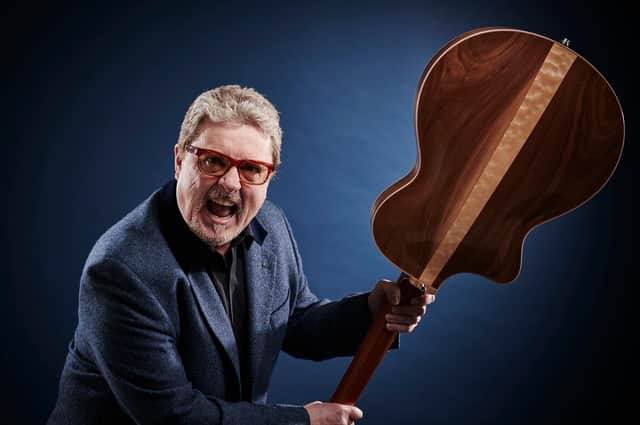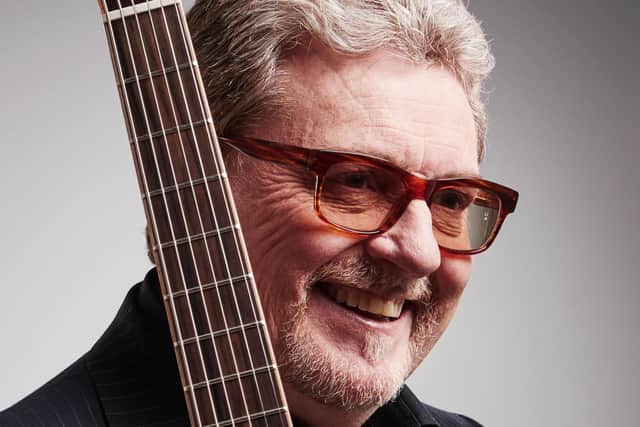Martin Taylor: 'I just found I had an aptitude for music'


American virtuoso Pat Metheny declared him “one of the most awesome solo guitar players in the history of the instrument”, while his friend the late Jeff Beck said that his nimble playing “out shreds the rest of us put together”.
Whittling 50 years of music-making down for a set like the one he is due to perform at Otley Courthouse next month is a tricky task, nevertheless he says a fondness for improvisation can keep even the most familiar tunes fresh. “Every time it’s just that little bit different,” he says. “There are lots of tunes that I’ve recorded more than once – that is the way of jazz musicians. In the years that I worked with Stephane Grappelli, he recorded a lot of the same tunes multiple times, and he’d already recorded them many times before that, but they’re never the same.
Advertisement
Hide AdAdvertisement
Hide Ad“It’s just something that we work on, and then I’ll drop them for a while and suddenly remember them. In fact, I’m thinking of a couple right now that I haven’t played for a long time that I think I’ll start playing again. Then you come back with a fresh approach to them – maybe change the feel, change the keys, come up with some other ideas, leave some space for improvising.
“Also, a lot of it’s to do with pacing and what I’m going to say about the tunes. Very often I get little batches of three that I play together because it’s basically storytelling, you’re getting a story going, you’re changing from one mood to the next. That’s my approach to it.”
Also renowned as an educator – his website has a wealth of online classes for all abilities – the 66-year-old enjoys talking about the songs that he plays. He says he fell into the role of teacher 14 years ago after co-writing a couple of books and doing the occasional workshop and masterclass. “In 2009 I was asked by a company in California called ArtistWorks to start my own online interactive guitar school,” he says. “I’d never taught before and I’d never been taught. I was out in California chatting to them and I suddenly realised (that although) I’ve been playing the guitar since I was four years old, I don’t really know what I’m doing, I’ve never analysed it, what is this exactly...so I had to look at my playing.
“The founder of ArtistWorks (David Butler) is also a guitar player and he started throwing questions at me; from that I started to figure out that underlying what I do that I don’t really think about, there is really a method to it. It then became a task to start organising the method and I started writing a whole series of instructional books – I’ve done about 10 now – on various topics. It’s about putting it in a form that people can understand; if you just delved into my head nobody would really understand it, I struggle to understand it myself.
Advertisement
Hide AdAdvertisement
Hide Ad“So that’s how that happened. Then I started to do guitar retreats around the world – in New York, California, Italy and where I live in Scotland. When you’ve learnt something and you put it into practice and you have that experience, it’s really important to pass it on. But I didn’t feel the time was ready until the early 2000s, I was still trying to get the hang of it myself, which I still am.”


Taylor was encouraged to take up the guitar aged four by his father, William, and became a professional musician at the age of 15 . “Strangely enough, my dad only started playing guitar a couple of years before I did, so we were kind of learning together,” he says. “He got me a little ukulele then a half-sized guitar and started showing me what he’d learnt so he was only a few lessons ahead of me at that time, although to me I thought he knew everything. But it was actually very good to do it that way because I wasn’t with somebody who was going to bamboozle me with anything. Then for whatever reason, I just found I had an aptitude for music.
“My dad came home one day and he had a double bass and he said to me, ‘You play the guitar now, I’ll play the double bass becaue you can never get a bass player’, and he joined that long line of bass players who started out as guitar players and just found it too hard and thought ‘I’ll take up the bass, I’m more likely to get gigs that way’.”
Taylor’s early musical hero was Django Reinhardt but he says he didn’t start playing with Reinhardt’s gipsy jazz “inflections” until much later when he formed the group Spirit of Django. “There’s a whole new genre that started around the time that I started my group in the early 90s,” he says. “That style of music – Hot Club – started to become very popular. It was actually very unfashionable for quite a long time and was kind of looked down upon by a lot of jazz aficionados. When Spirit of Django did that advert for the Renault Clio car playing on that theme, it just captured people’s imaginations as a kind of music. But I always played it in my own style.
Advertisement
Hide AdAdvertisement
Hide Ad“In fact, how we got the name Spirit of Django came from Stephane Grappelli because he played on the second album that we made and when he heard me playing some of these things he said ‘You’re playing with the spirit of Django but you’re doing it in your own style’.
“My dad used to play all these records of Count Basie, Duke Ellington, Coleman Hawkins, Ella Fitzgerald, Louise Armstrong, Eddie Lang and Joe Venuti and I love that music, but when I heard Django there was something that connected with me a lot more. As a child, I didn’t really understand it but the only way I could explain it to my dad was to say ‘When Django plays it’s like he’s talking to me’. It was very direct and I was almost not conscious of the fact that he was playing a guitar, just the music.
“As I got older and realised music is storytelling, that’s what it was: he was telling the listeners a story. I loved the sound, it was very happy music, it had this very sunny feel to it. But I like lots of other jazz as well, and other kinds of music too. The thing that I couldn’t get from other music I encountered was improvisation. I could never have played classical guitar. Technically I can play classical guitar, but I couldn’t interpret it in exactly the same way every time. In jazz, it’s the complete opposite of that: nobody wants you to play it exactly the same every time. It’s organic, it just grows and grows, that’s how I can still play tunes now that I started playing when I was a kid.”
After a spell playing on the QE2 ocean liner, Taylor befriended Ike Isaacs, whose playing was to greatly influence him. “That’s really how I started to develop as a musician,” he says. “So everything that I do now, especially what people will hear me do at the Courthouse in Otley is an extension of Ike.”
Advertisement
Hide AdAdvertisement
Hide AdThe pair would go on to form a guitar duo, whose first gig was at Pizza Express founder and jazz enthusaist Peter Boizot’s new venue, Pizza on the Park. Through Isaacs he met the French jazz violinist Stephane Grappelli, with whom he would go on to make 13 albums. He says he actually first got a job in Grappelli’s band in 1979 via a friend who was a bassist. “He said ‘your name come up in conversation – would you do these gigs in France and Belgium and there are a couple of TV shows?’ So I went there imagining that would be a one-off. In fact, I didn’t think it would even happen because on the first night a French agent told me to go to Nantes in the north-west of France. He hadn’t given me any details, so I’m walking around Nantes looking for posters to see where I was supposed to be playing. I couldn’t figure anything out at all, and this was the days before mobile phones, so I found a phonebox and managed to get some centimes and rang Michel saying ‘I’m in Nantes, I don’t know where to go’ and he said ‘Why are you in Nantes? It is Mont’, a suburb of Paris. I was in the wrong place and I didn’t have time to get there so I missed the first gig and thought I was fired before I even started.
“But the next night the gig was in Deauville, so I made my way there and met Stephane. I thought I was in trouble so I go in and say ‘Stephane, I am so sorry that i missed the gig but Michel told me it was in Nantes’. He said ‘Don’t worry, my dear, Michel, he is stupid, he always make the mistake. He is my agent but I am his manager’. So we did about four dates together and these TV shows and we just got on very well together musically.
“I would have been 22 or 23. He was amazed that this young guitar player who he would’ve thought would have played rock ’n’ roll not only knew this music but could play all the tunes. He asked me how I knew this music and I said ‘my dad was a jazz musician, I grew up on you and Django’. At the end of that he said ‘I’ve got a tour of America coming up, would you come on that?’ I said ‘Yes, great’. After that there was a tour of the UK and then we went back to America. It went on for 11 years that way.”
Martin Taylor plays at Otley Courthouse on June 4. https://martintaylor.com/
